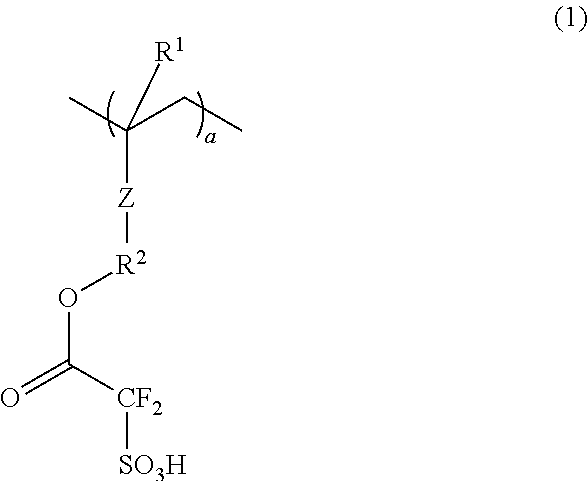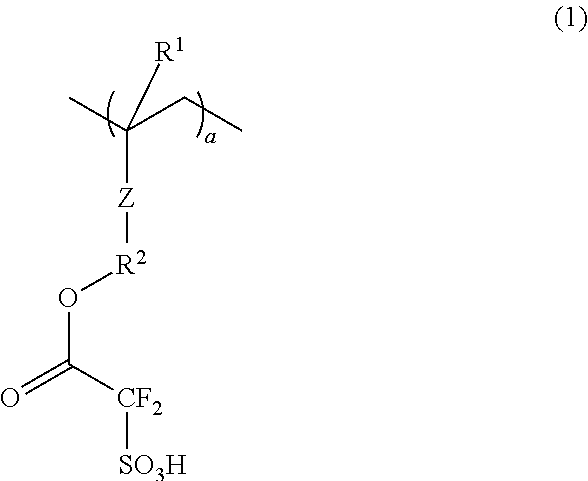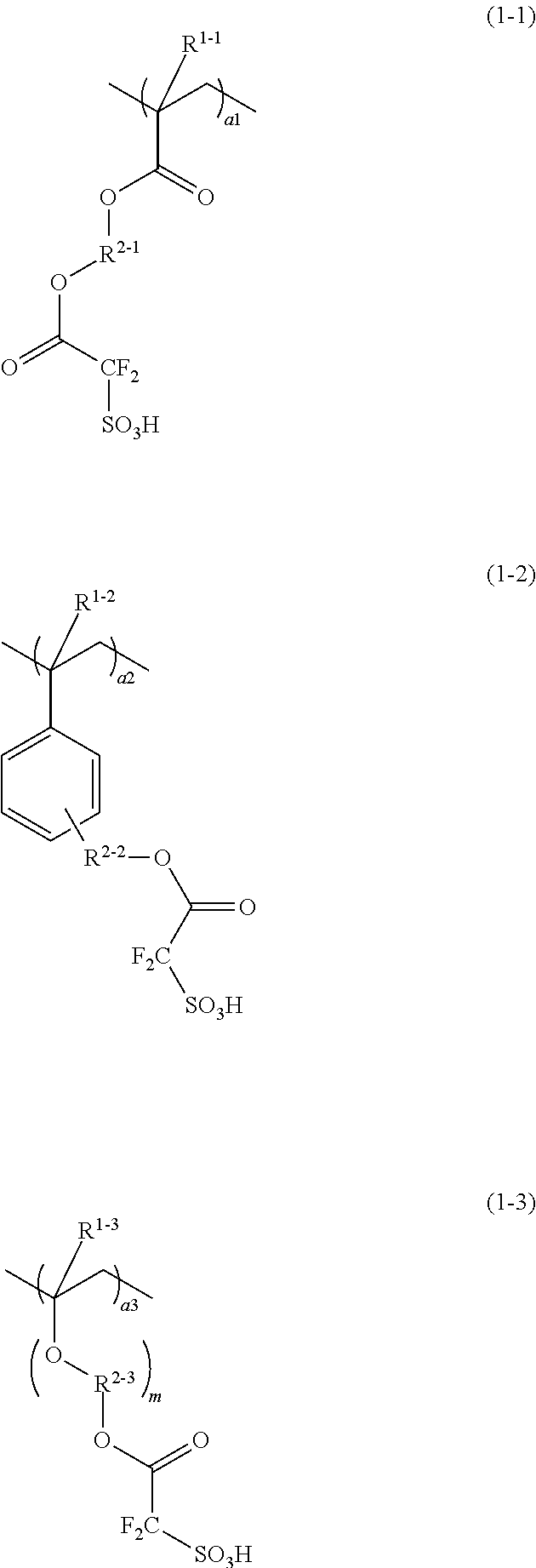Conductive polymer composite and substrate
a polymer composite and conductive technology, applied in the direction of non-metal conductors, conductors, organic conductors, etc., can solve the problems of poor film-formability by spin coating, poor conductivity, rough surface where film is formed, etc., to achieve excellent conductivity and transparency, good filterability, and low viscosity
- Summary
- Abstract
- Description
- Claims
- Application Information
AI Technical Summary
Benefits of technology
Problems solved by technology
Method used
Image
Examples
synthesis example 1
[0109]Under nitrogen atmosphere, to 37.5 g of methanol stirred at 64° C. was added dropwise a solution in which 31.0 g of Monomer 1 and 5.13 g of dimethyl 2,2′-azobis(isobutyrate) had been dissolved in 112.5 g of methanol, over 4 hours. The mixture was further stirred at 64° C. for 4 hours. After cooling to room temperature, the mixture was added dropwise to 1,000 g of ethyl acetate under vigorous stirring. The resulting solid was collected by filtration, and dried under vacuum at 50° C. for 15 hours to obtain 26.2 g of a white polymer.
[0110]The obtained white polymer was dissolved in 912 g of pure water, and the sodium salt was converted into a sulfo group by using an ion exchange resin. When the obtained polymer was measured by 19F-NMR, 1H-NMR, and GPC, the following analytical results could be obtained.
[0111]Weight-average molecular weight (Mw)=46,000
[0112]Molecular weight distribution (Mw / Mn)=1.81
[0113]This polymer compound was named Dopant polymer 1.
synthesis example 2
[0114]Under nitrogen atmosphere, to 37.5 g of methanol stirred at 64° C. was added dropwise a solution in which 15.5 g of Monomer 1, 9.5 g of lithium styrenesulfonate, and 5.13 g of dimethyl 2,2′-azobis(isobutyrate) had been dissolved in 112.5 g of methanol, over 4 hours. The mixture was further stirred at 64° C. for 4 hours. After cooling to room temperature, the mixture was added dropwise to 1,000 g of ethyl acetate under vigorous stirring. The resulting solid was collected by filtration, and dried under vacuum at 50° C. for 15 hours to obtain 21.3 g of a white polymer.
[0115]The obtained white polymer was dissolved in 912 g of pure water, and the sodium salt and the lithium salt were converted into sulfo groups by using an ion exchange resin. When the obtained polymer was measured by 19F-NMR, 1H-NMR, and GPC, the following analytical results could be obtained.
[0116]Copolymer Composition Ratio (Molar Ratio)[0117]Monomer 1: styrenesulfonic acid=1:1
[0118]Weight-average molecular weig...
synthesis example 3
[0121]Under nitrogen atmosphere, to 37.5 g of methanol stirred at 64° C. was added dropwise a solution in which 30.8 g of Monomer 2 and 5.13 g of dimethyl 2,2′-azobis(isobutyrate) had been dissolved in 112.5 g of methanol, over 4 hours. The mixture was further stirred at 64° C. for 4 hours. After cooling to room temperature, the mixture was added dropwise to 1,000 g of ethyl acetate under vigorous stirring. The resulting solid was collected by filtration, and dried under vacuum at 50° C. for 15 hours to obtain 26.8 g of a white polymer.
[0122]The obtained white polymer was dissolved in 912 g of pure water, and the lithium salt was converted into a sulfo group by using an ion exchange resin. When the obtained polymer was measured by 19F-NMR, 1H-NMR, and GPC, the following analytical results could be obtained.
[0123]Weight-average molecular weight (Mw)=46,000
[0124]Molecular weight distribution (Mw / Mn)=1.55
[0125]This polymer compound was named Dopant polymer 3.
PUM
| Property | Measurement | Unit |
|---|---|---|
| absorption at a wavelength | aaaaa | aaaaa |
| temperature | aaaaa | aaaaa |
| reaction time | aaaaa | aaaaa |
Abstract
Description
Claims
Application Information
 Login to view more
Login to view more - R&D Engineer
- R&D Manager
- IP Professional
- Industry Leading Data Capabilities
- Powerful AI technology
- Patent DNA Extraction
Browse by: Latest US Patents, China's latest patents, Technical Efficacy Thesaurus, Application Domain, Technology Topic.
© 2024 PatSnap. All rights reserved.Legal|Privacy policy|Modern Slavery Act Transparency Statement|Sitemap



